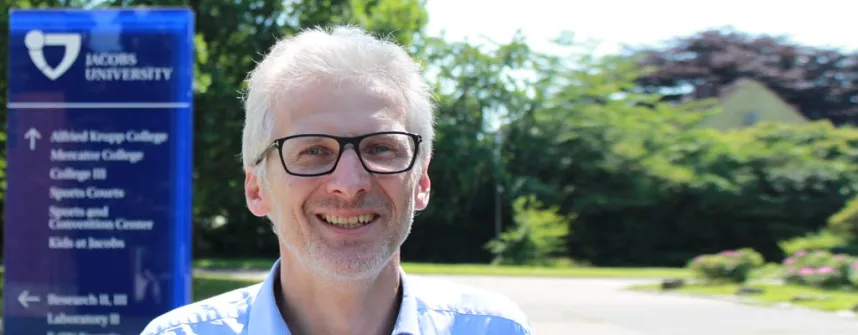The Orienteerer
(Source: Constructor University)
At Jacobs University he was one of the professors at hour one. Now Adalbert Wilhelm wants to use his knowledge to help those looking for the right major for their studies. The 53-year-old recently became the Academic Coordinator of the Foundation Year Program – an orientation year designed by Jacobs University to help young people find their own way.
What can I do? What do I like? In what direction do I want to develop? Adalbert Wilhelm knows from his own experience that such questions are not always easy to answer. “I still remember very well how difficult it was for me to chose the areas for my school-leaving exams,” he recalls. In the end he chose mathematics and natural sciences as his focal points. “That’s where I was most sure of myself. However, I also always had a big interest in foreign languages, internationality, other countries.”
Today, Adalbert Wilhelm can combine the two. The Professor of Statistics likes the international flair of Jacobs University, at which he has been doing research and teaching for 15 years. He also considered studying chemistry or French, but then decided on the then innovative program in economic mathematics – mathematics combining economics and computer science. “Back then, this combination was not yet as widespread as today. After all, it was in the 1980s that computer technology first began to move into many offices.”
A lot of other things have also changed at German universities since his own colleage years in the 1980s. This is due in no small part to the fact that young men are no longer subject to military or civilian service and many students graduate not after 13 years but after just 12 years. The consequence: The average age of students starting university studies has dropped distinctly. At the same time, the switch to Bachelor and Master degrees has also cut the time required for getting a degree. “But getting a degree as young as possible is not an end in itself,” says Wilhelm. “After all, you also need an idea of what you want to do after you finish studying”.
For young people, it is often not easy to picture what everyday working life looks like in many academically oriented professions. “At the same time, they have many more options than earlier generations of secondary school graduates,” says Wilhelm. “For one thing thanks to open borders in Europe. For another because digitialization brings with it completely new professional areas and information options.”
In a survey by the German Center for University and Scientific Research, 43 per cent of secondary school graduates in 2012 said that the “almost unlimited number of options” caused them problems. About one-third of those surveyed were unclear about their own interests.
Wilhelm advocates viewing such orientation difficulties after graduation from secondary school not as a weakness but an opportunity. “Often it is particularly the graduates with versatile gifts and interests that find it particularly difficult to decide on a particular course of study or career path. The better the grades, the greater the selection of possible courses of study. Deciding upon one major then means deciding against a lot of others.”
In the Foundation Year Program, young people can try things out for one year before choosing a major. The contents of the two-semester program consist of mandatory introductory courses, in which students get insights into various areas and are familiarized with the methods of academic work. After intensive personal consultation, the participants take courses in focal areas they themselves select in the natural, economic, or social sciences. In this way they get to know various degree programs and deepen their knowledge.
As the Academic Coordinator of the program, Adalbert Wilhelm ensures that the participants in the Orientation Year get the individual support they need. The reasons for participating in the Foundation Year Program vary greatly, he knows: “Some mostly want to get a feeling for what lurks behind certain fields and for the expectations facing them there. Others mostly want to gain confidence in using the English language, before beginning a course of study in English. Many come to us with a very clear idea, which they can advance very concretely – Foundation Year is orientation, but also targeted support.”
Talking with Adalbert Wilhelm about his new responsibility, you quickly notice: He has no trouble understanding the decision-making difficulties of high school graduates. For one thing because he has already experienced it with his two children, who are now adults. For another because he experienced it himself. Although his own career seems rather linear: graduation, college, undergraduate degree, doctorate, professorship, followed by teaching activities in Augsburg, Fairfax Virginia, and now Bremen. Even so, Adalbert Wilhelm puts this impression into perspective. “Looking back through a curriculum vitae, a lot of things look very clear and decisive,” he smiles. “But it only shows the milestones along the career path; not the uncertainties encountere along the way.”
